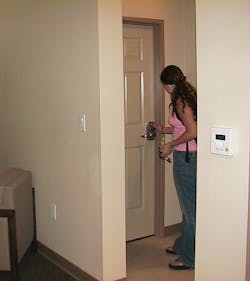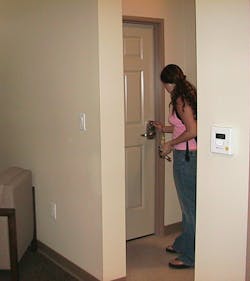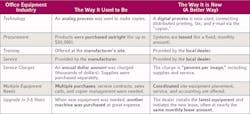A New Lease on Access Control
The security industry has, over the last 100 years, designed and manufactured products that meet the diverse needs of a variety of building types and sizes, responding to changes brought about by tragic fires, the requirements of those with disabilities, etc. Those in the business of security are intimately familiar with the codes that govern the doors we pass through multiple times every day. Whether it's compliance with Building Officials and Code Administrators (BOCA), the Health Insurance Portability and Accountability Act (HIPAA), or Underwriters Laboratories Inc. (UL), products and their applications have become more specialized. Exit devices, sliding doors, and automated door controls are just some of the products that make it easier to exit a building during an emergency or gain access without facing obstacles.
As the need for higher security grows, products are beginning to incorporate more and more technology, such as wire drops, antenna placement, system configuration, biometric readers, etc. With these newer technologies, service requirements have also grown; 24/7 service capability has become the standard. As a result, building owners and facilities managers have come to depend on their relationships with architects, general contractors, manufacturers, specification writers, and integrators to select the optimal, most cost-effective door security systems.
Factoring in code compliance and access-control needs with rapidly changing security-technology solutions and the purchase of compliant door hardware, access-control panels, open-architecture readers, and integration services makes it an extremely complex world. To keep security systems current, a building owner would have to upgrade every couple of years.
But, what if building owners could keep up with technology and tailor their access-control systems to the level of security required by each of their tenants? What if the cost of providing the latest technology upgrades could be passed on to those tenants without a lot of pain? All of these things are possible.
How It Works
The example shown in the chart below can be applied to access-control systems to ease the burden weighing on the minds - and budgets - of facilities managers. Facilities managers, working with security consultants and access-control integrators, can provide the latest, greatest, most tailored security solution by allowing each tenant company to lease the systems for its occupied space.
A freestanding data center, for example, could be supported by a large integrator that has specified and supplied two of its three entrances with a biometric hand-geometry reader, which, upon verification of the user, releases an electromagnetic lock and trips the mobile DVR to retain a digital image of the person gaining access. At each entrance/exit, there is also a request-to-exit device for egress, a door position switch, and, of course, a power supply. Access to the third entrance is by way of a secured area; therefore, it has a hard-wired, open-architecture, locking device with an integrated reader and other monitoring capabilities.
All of this equipment (including the head-end access-control panel and other supporting equipment) may cost the building owner between $8,000 and $12,000 per door, plus additional costs for any service calls. Data-center management benefits by having the best security, monitoring, digital capture of access points, and so forth, albeit with a lot of cost. Looking forward, though, will that same equipment meet the needs of the data center in 3 or 4 years? Of course not. Will you need to purchase new systems to keep up? No.
In the future, it's probable that the integrator will finance the entire sales and service cycle in partnership with the major manufacturer and a financial services partner. The cost to the building owner will be minimized since the systems are leased, not purchased. Administration of security will be eased for the building owner and facilities manager. Cash flow will be more easily managed.
Likewise, the initial purchase of equipment and the ongoing investment in site service and support will not cripple the integrator because the integrator's inventory will be financed interest-free. In other words, with leased systems, the building owner and integrator have a more workable security business relationship.
And the data center? It will be secured with an optimal solution that will continue to improve as technology changes.
With leased systems, the data center's integrator may do a monthly, on-site audit of all the equipment and check the integrity of any electrified hinges or similar power-transfer devices. The integrator would also replace batteries as necessary and fine-tune each opening.
After 3 years (or some predetermined timeframe), the integrator would meet with the building owner to upgrade equipment, add secured openings, and perform any other needed upgrades.
Leasing Can Be a Win-Win for All
Leased systems can be beneficial for the tenant and building owner, who obtain up-to-date, fully serviced security devices that meet today's known needs and have the flexibility to assure that tomorrow's demands are covered.
It's a win-win for the integrator and manufacturer, who garner a growing and sustainable relationship that positions the integrator to purchase and install the best equipment, and provide stellar service to building owners and tenants.
The same scenario used for the data-center tenant may be applied to a light-assembly factory building, a healthcare facility, or a 10-story office building populated with tenants occupying from one to 20 offices. Each of these locales has different security concerns, from compliance with HIPAA for the small medical office to protecting people and securing assets in the workplace.
The equipment and systems expert (the integrator) can consult with the building owner on exactly what is needed to secure each tenant space. Whether it is with simple, battery-operated, standalone, programmable locks from which an audit of transactions can be downloaded, or a more sophisticated, wireless access system employing biometric devices, the ability to employ state-of-the-art equipment can allow facilities to attract forward-thinking businesses as tenants.
This table shows how similar changes in another industry were successfully implemented. The example featured here is based upon the document-management industry. This industry used to be called the "office-equipment business" and, before that, the "copier trade." Even the name of the industry has evolved to keep pace.
The Future is Here
Many integrators are ready with the broad service capability to provide 24/7 oversight and regular maintenance of door hardware, battery replacement, system checks on CCTV, and administrator training to keep your building safe and secure, and to constantly meet the needs of the tenant/occupant. Knowing that their workplace is secured by a highly reliable, regularly maintained, integrated access-control system gives everyone peace of mind.
The future of the leased access-control system is here: But, it will take the building owner and facilities manager to change the paradigm by requesting it.
Marilyn Collins is business development manager at Carmel, IN-based Ingersoll Rand Security Technologies.


